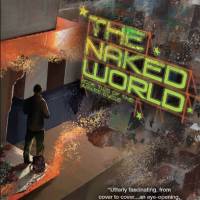It's been a banner year for science-fiction films. In October, cinema fans flocked to see Harrison Ford in "Blade Runner 2049." And "Star Wars: The Last Jedi," featuring Mark Hamill and the late Carrie Fisher, premiers in the U.S. on Dec. 15.
The Naked World, by Eli K. P. William.
480 pages
TALOS PRESS, Fiction.
Likewise for books: Following in the footsteps of Canadian-American SF author William Gibson, who foresaw the creation of cyberspace ("a consensual hallucination experienced daily by billions of legitimate operators, in every nation"), Toronto native Eli P.K. William serves up his own bleak vision of Japan's dystopian future. While a completely original work, characters in "The Naked World" — part two of the "Jubilee Cycle" trilogy — face predicaments evocative of works by Jonathan Swift, Aldous Huxley, Philip K. Dick, George Orwell and Stephen King.
Back from part one is protagonist Amon Kenzaki, a Japanese-Iranian who survives impending "bankdeath" — a fate far more ruinous than bankruptcy — and makes it over to the "naked" world, where exiled inhabitants subsist apart from the all-embracing ImmaNet, whose electronic overlay made the other side of Tokyo appear clean and modern, its people attractive and the food tasty.
The vending machines of the future defend themselves against hungry and thirsty vandals; oversized capsules are programmed to sprout into prefabricated rooms where people reside; and everything from clothing to office buildings is made from bio-degradable materials. In the Tokyo of the future, the only thing still recognizable is the arrival of an autumn typhoon.



















With your current subscription plan you can comment on stories. However, before writing your first comment, please create a display name in the Profile section of your subscriber account page.